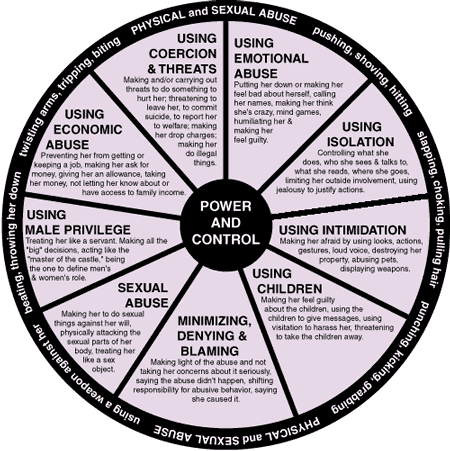 Emotional abuse is insidious. It can be worse than physical abuse.
Emotional abuse is insidious. It can be worse than physical abuse.
So what is it? Read the following excerpt from the book The Emotionally Abused Woman: Overcoming Destructive Patterns and Reclaiming Yourself. It’s by Beverly Engel, MFCC. It’s about 230 pages. Although the book is directed at women, it applies equally to both sexes.
Keep in mind that this book was written for women who are victims of domestic abuse.
However — and here’s an important point — for a man , or a woman, the reactions to the abuse are the same. If, after reading this, you feel trapped in an emotionally abusive relationship, please get help. If a child in your home is experiencing this kind of abuse, please do all you can to protect them from its harmful effects.
Emotional abuse is any behavior that is designed to control another person through the use of fear, humiliation, and verbal or physical assaults. It can include verbal abuse and constant criticism to more subtle tactics like intimidation, manipulation, and refusal to ever be pleased.
Emotional abuse is like brainwashing in that it systematically wears away at the victim’s self-confidence, sense of self-worth, trust in her perceptions, and self-concept. Whether it be by constant berating and belittling, by intimidation, or under the guise of “guidance” or teaching, the results are similar. Eventually, the recipient loses all sense of self and all remnants of personal value.
Emotional abuse cuts to the very core of a person, creating scars that may be longer-lasting than physical ones. With emotional abuse, the insults, insinuations, criticism and accusations slowly eat away at the victim’s self-esteem until she is incapable of judging the situation realistically. She has become so beaten down emotionally that she blames herself for the abuse. Her self-esteem is so low that she clings to the abuser.
Emotional abuse victims can become so convinced that they are worthless that they believe that no one else could want them. They stay in abusive situations because they believe they have nowhere else to go. Their ultimate fear is being all alone.
Following are types of emotional abuse:
- DOMINATION: Someone wants to control your every action. They have to have their own way, and will resort to threats to get it. When you allow someone else to dominate you, you can lose respect for yourself.
- VERBAL ASSAULTS: berating, belittling, criticizing, name calling, screaming, threatening, excessive blaming, and using sarcasm and humiliation. Blowing your flaws out of proportion and making fun of you in front of others. Over time, this type of abuse erodes your sense of self confidence and self-worth.
- ABUSIVE EXPECTATIONS: The other person places unreasonable demands on you and wants you to put everything else aside to tend to their needs. It could be a demand for constant attention, frequent sex, or a requirement that you spend all your free time with the person. But no matter how much you give, it’s never enough. You are subjected to constant criticism, and you are constantly berated because you don’t fulfill all this person’s needs.
- EMOTIONAL BLACKMAIL: The other person plays on your fear, guilt, compassion, values, or other “hot buttons” to get what they want. This could include threats to end the relationship, the “cold shoulder,” or use other fear tactics to control you.
- UNPREDICTABLE RESPONSES: Drastic mood changes or sudden emotional outbursts (This is part of the definition of BPD). Whenever someone in your life reacts very differently at different times to the same behavior from you, tells you one thing one day and the opposite the next, or likes something you do one day and hates it the next, you are being abused with unpredictable responses.This behavior is damaging because it puts you always on edge. You’re always waiting for the other shoe to drop, and you can never know what’s expected of you. You must remain hypervigilant, waiting for the other person’s next outburst or change of mood.An alcoholic or drug abuser is likely to act this way. Living with someone like this is tremendously demanding and anxiety provoking, causing the abused person to feel constantly frightened, unsettled and off balance.
- GASLIGHTING: The other person may deny that certain events occurred or that certain things were said. You know differently. The other person may deny your perceptions, memory and very sanity. (If a borderline has been disassociating, they may indeed remember reality differently than you do.)
- CONSTANT CHAOS: The other person may deliberately start arguments and be in constant conflict with others. The person may be “addicted to drama” since it creates excitement.